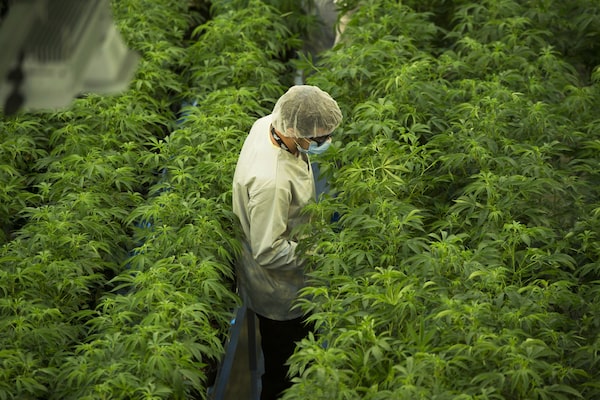
Staff work in a marijuana grow room that can be viewed by at the new visitors centre at Canopy Growths Tweed facility in Smiths Falls, Ontario on Thursday, Aug. 23, 2018.Sean Kilpatrick/The Canadian Press
Canopy Growth Corp. announced Thursday it plans to lay off about a third of the company’s staff – close to 800 people – and close its flagship production facility in a former Hershey chocolate factory in Smiths Falls, Ont. It’s the latest blow to one of Canada’s cannabis giants, which boasted an $18-billion stock market valuation less than four years ago.
Here’s a timeline of how Canopy’s marijuana dreams went up in smoke.
2013: Canopy Growth Corp., known as Tweed Marijuana Co. at the time, takes over the abandoned Hershey factory in Smith Falls, revitalizing the hard-bitten Ontario town sometimes referred to as “Skid Falls” in neighbouring Perth.
August 2018: Constellation Brands Inc., the global alcohol company that makes Corona beer and Robert Mondavi wine, invests $5-billion in Canopy − hedging against potential declines in beer and liquor sales as consumer tastes shift.
October 2018: Canada officially becomes the second country in the world legalize recreational marijuana. Amid celebrations across the country, websites and stores sell out of many brands and strains in hours as customers endure long lines to be a part of the historic day.
November 2018: With 750 employees at Canopy’s Smiths Falls headquarters, the small town sees a real estate boom.
April 2019: Canopy pays US$300-million to secure the rights to buy U.S. cannabis producer Acreage Holdings Inc., strategically positioning itself should federal marijuana laws change in the United States.
Bruce Linton, Founder, Chairman and co-ceo of Canopy Growth, is photographed in the company's Tweed visitor centre in Smiths Falls, Ont., on Sept 21 2018..Fred Lum/the Globe and Mail
July 2019: Bruce Linton, the co-founder of Canopy and one of the cannabis industry’s most prominent executives, is fired after months of poor financial results and rising tensions with the company’s new owner. Mark Zekulin is named interim leader of the company as it searches for a new chief executive officer.
November 2019: With little access to fresh cash, Canada’s licensed cannabis producers face a new reality. Once an investment banker’s dream, Canada’s marijuana fever has broken under the weight of warnings about ridiculous valuations, bad deals and aggressive stock promotion.
March 2020: Canopy closes two massive greenhouses in British Columbia and lays off 500 employees, as the company seeks to slow its cash burn and bring its production in line with lower-than-expected demand for legal marijuana.
December 2020: Canopy cuts ties with its venture capital arm, Canopy Rivers Inc., as the investment company struggles with several poorly-performing assets and massive losses on a greenhouse project in Leamington, Ont.
April 2021: Canopy chief financial officer Mike Lee tells investors in a virtual presentation that COVID-19-driven headwinds in Canada will likely have an impact on Canopy’s near-term performance.
November 2021: Canopy replaces Mr. Lee and its long-serving chief product officer in an executive shakeup that comes barely two weeks after the company reported weak earnings. Mr. Lee, Canopy’s executive vice-president and CFO, and Rade Kovacevic, president and CPO, are replaced by Judy Hong and Tara Rozalowsky.
August 2022: Four years after Canadian cannabis stocks peaked in September, 2018 – a month before recreational marijuana was legalized – many mid-tier producers have merged with rivals simply to stay alive. Canopy’s share price has collapsed from $67.74 on Sept. 7, 2018, to $3.39.
September 2022: Canopy exits the cannabis retail business with two deals to divest its Tweed and Tokyo Smoke stores.
November 2022: Canopy CEO David Klein has high hopes for the U.S. Senate and potential cannabis legislation after midterm elections. Canadian cannabis companies believe Washington is serious about federally legalizing cannabis and predict the U.S. will deliver big pot profits.
February 2023: Canopy announces layoffs and the closure of its flagship production facility in Smiths Falls.